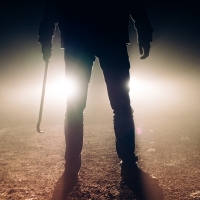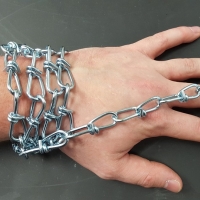- About Us
- Columns
- Letters
- Cartoons
- The Udder Limits
- Archives
- Ezy Reading Archive
- 2024 Cud Archives
- 2023 Cud Archives
- 2022 Cud Archives
- 2021 Cud Archives
- 2020 Cud Archives
- 2015-2019
- 2010-2014
- 2004-2009
 |
Cud Flashes In The Pan |
This month’s theme:
Corridor & Cereals Part 3 - Horror Stories
Regular readers know that I occasionally do a column with stories that share titles with the songs of various recording artists. Here begins a multi-month entry honoring one of my favorite musical duos: Hall & Oates. As of this writing, Daryl Hall and John Oates have recorded 18 studio albums, but they have 28 compilation “best of” albums. It’s nice when labels shamelessly try to make as much money as they can, no matter how silly it looks.
These are “horror” stories, because a story doesn’t have to be about a slasher or a ghost or a vampire to be horror. But we’ll start with something like that. (Next month is The Cud’s “best of the year” reprint issue, so Corridor & Cereals Part 4: Fantastic Yarns will appear in December.)
“Maneater”
Horror
By David M. Fitzpatrick
Sally met Jerome in a bar. He was a little drunk, but so was she, and she was interested. Soon, he dared to put his hand on her knee, and she let him run it up her thigh. When he kissed her and asked if she wanted to get out of there, she told him, “Are you sure? I’m a maneater.”
He chuckled, probably because she was barely five-two and one-ten. He was a foot taller and twice her weight. “I can handle it.”
“You just have to stay until morning.”
“Sure thing, baby.” His voice was smooth as silk; she knew he was just looking for a quick romp, but she knew she could change his mind. When he experienced how incredible she was in bed, he’d stay all night and probably all the next day.
She let him drive her home, and she knew he was doing mental backflips. She led him through the dark, up the steps, and into the house. The dim glow of the TV in the living room barely lit up Grammie.
“Is that you, dearie?” the old woman called out.
“Yes, Grammie. I have company.”
“Oh, not another one! Why, girls in my day would never bring a strange man home for sex…”
Sally hurried up the stairs, pulling Jerome by the hand, as Grammie ranted. When she closed the old bedroom door and wrapped her arms around him, he said, “Not another one, huh?”
“Don’t you judge me,” Sally snapped. “If you want me, don’t you dare judge me.”
He smiled and ran his hands down her body. “No judging.”
“You sure you can handle me—all night, until the sun comes up?”
“My pint-sized maneater?” He laughed. “I’ll do my best.”
They stripped down and tumbled into her bed, and he was good—for a solid hour and four climaxes for her. After she screamed out for her fifth and sent him over the edge with his own orgasm, he rolled off her as she heard her grandmother pounding on the ceiling with her cane.
“Don’t mind her,” she said, breathing hard. “She’ll go to sleep soon. We can play again later. And again before the sun comes up.”
“Uhhh… well…” Jerome rolled and sat up, reaching for his pants. “I have to head home. Work first thing in the morning.”
She sat bolt upright. “You can’t leave until morning. You promised.”
“Sorry. It was fun, but I have to go.”
She slouched back against the headboard. “So that’s it? I’m just a cheap playtoy to you?”
He stood up and pulled on his pants. “No—I just can’t stay. I have to work at six in the morning. If I get home by one, I can get four solid hours before I have to get up. Don’t worry; I’ll be quiet so your grandma doesn’t hear me leave.”
“You HAVE to stay until morning.”
He laughed as he pulled on his shoes. “Listen, maneater… give me your digits, and maybe we can hook up again sometime.”
“Don’t leave!” She was trying not to raise her voice—trying not to get angry. “I’m warning you.”
He pulled his shirt on and faced her. “Give it up, Sally. This was a one-night stand, and we both know it.”
Her mouth hung open. “Are you calling me a slut?”
He shrugged. “You and me both, I guess.”
Her fury subsided, and a sense of calm came over her. “Remember: I warned you.”
“Whatever,” he said, and he threw open the bedroom door—
—and Grammie stood there with her cane. She looked about ninety, even tinier than Sally.
“Did you use my baby granddaughter for sex, young man?” she cried.
“Damn right,” he said. “But I never will again, lady.”
In the wink of an eye, Grammie transformed. She ballooned in size until she towered above Jerome, her body bloating out, her snout extending into a gaping maw full of razor teeth. He screamed as she pounced on him, but as soon as she tore out his throat, the sounds stopped.
Sally watched from the bed as Grammie fed on him.
“He shoulda stayed until morning, Grammie,” she said.
“Is It a Star”
Science fiction
By David M. Fitzpatrick
The night sky was inky black except for the pinpoints of light that dotted everywhere like some luminescent connect-the-dots game. Leela walked in the park with Elliot, her eight-year old, who tugged on her hand and pointed.
“Is it a star, Mom?” he asked.
She didn’t need to look, but she did anyway. The brightest point of light, low in the western sky, seemed as bright as a full moon, and it looked a lot bigger than a star—maybe a tenth the width of the moon. It glowed brilliantly as it reflected the light of the unseen Sun. always She knew that, one day, the questions would come. Now, here they were.
“No, sweetie,” Leela said. “That’s Chernobog. It’s an asteroid that has fallen into Earth’s orbit. Actually, it’s a rogue planetoid, they call it. It’s trailing us, but moving just a bit faster.”
“So… it’s chasing us?”
He was only eight. They said to answer questions when children asked them, but Leela wasn’t ready for it. “Yes, I guess it is. Hey, how about we go to the hog-dog stand and get some late dinner?”
Elliot wrenched his hand from hers and stepped away. His neck was craned, his face heavenward, staring at Chernobog’s gleaming form.
“It’s moving faster. So that means it will hit us, right?”
She fought back emotion. “It will take twenty more years before it catches up to us. In the meantime, the scientists are working on how to stop it. Come now—they have ice cream, Elliot!”
He moved forward, watching the asteroid. “How will they stop it?”
“They’re planning missions. Nuclear bombs and such. They’re going to divert it so that it stops chasing us.”
“What if they can’t do it?”
Leela didn’t answer. She couldn’t. She turned away from her innocent child. “I’m really hungry, Elliot.”
“How big is it?”
She hadn’t expected so many questions at once, but it was like his mental faucet had been turned on and couldn’t be shut off. “Almost three hundred miles across.”
Leela watched his face as he went through the math in his head, and she saw his eyes widen. “That’s more miles across than our state. If it hits us, it will kill us. Right?”
Her back to him, she began crying.
“It will destroy Earth, right?”
She swallowed hard, and through her tears she said, “Yes.”
He rejoined her, taking her hand. “I guess we should get hot dogs and ice cream while we can, then.”
She broke down, and he hugged her. It wasn’t supposed to be this way. He should be crying, and she should be comforting him.
“Don’t worry, Mom,” Elliot said. “I’m going to study hard in school, and grow up to be one of the scientists who are trying to stop Chernobog from hitting us.”
Leela held him close, bawling in the park at night. She swore she could feel the light of Chernobog shining on them like a spotlight.
“Cold Dark and Yesterday”
Horror
By David M. Fitzpatrick
It was once the caretaker’s house, but hadn’t been for decades. Given its location, Tom Reiner had bought it dirt cheap. It looked just like a haunted house in a tacky B-movie, and not just because it was surrounded on all sides by an old cemetery. No one had been buried there in over half a century, and the graves dated to the late 1600s; stones were covered in dried lichen and stained with centuries of rain, and many were leaning, cracked, or broken. Nobody cared about the dead there. They’d care just as much for one more.
The price had been right. The house wasn’t in horrible shape, at least structurally; he was a handyman, so fixing up the interior wouldn’t be a big deal. The cemetery was far back from the road, separated from that road by a thick line of trees, so he’d have privacy.
Jenny Reiner wasn’t thrilled about being surrounded by a cemetery, and she tried to convince her husband that it was a bad idea. She didn’t want to live surrounded by dead bodies.
“You’re behaving like a child,” he told her. “They’re just dead people. There are no ghosts, no ghouls, no zombies. Grow up and get over it, because we’re buying this house.”
She always did what he said. Tom had made sure early on that he established his dominance as the head of their marriage and her life. She wasn’t bad looking, but he’d had better, and now he could have better once again. Not that marriage had stopped him from having fun; now, she wouldn’t even be in the way, now that her grandfather had finally died at the nursing home. She had no other relatives, so he’d left everything to her. The old man had done well in a few commodities long before Tom had been born, and he’d invested well. Three million bucks for the inheritance, free and clear, once all the taxes were paid. But Tom knew that the money might well embolden his otherwise acquiescent wife. That’s why Tom had found the old caretaker’s house. Once she was gone, he’d inherit everything she had.
She was in the living room, peeling off the ancient wallpaper, and calling out to Tom how nice the new wallpaper would look in there, and how nice the hardwood floors would look once they were stripped and refinished, when he came up behind her with the tire iron. She was in mid-sentence when he hit her as hard as he could: “Honey, I really love that old sink in the kitchen; they don’t make them like that any—” And when the tire iron hit her, she said something like “GURK!” and that had Tom laughing as she collapsed to the floor.
The head wound was superficial, and only bled a bit—mostly because she was dead probably within a minute. Not a drop got on the floor.
He didn’t make the same mistakes that they made in the movies. He wasn’t going to bury her in an existing grave; that’s where they’d look. Of course, there’d be no one to look for her; she had no family, and any friends that she’d had were long gone, after Tom took control of Jenny’s life and made sure the contact was cut. He went out to the farthest back edge of the cemetery, where it bordered the thick forest, and carefully cut out the sod, rolling it back and cutting under it some more, little by little, until he’d rolled it up like the way it came from sod companies, all in one piece.
Digging the grave took a bit longer, and it was night before it was deep enough. He only went down a few feet; the landscape in that area was full of pits and depressions, so if it sunk in as she decomposed, no one would ever notice—even if anyone ever came back there. No one would.
He rolled her in a painter’s tarp, dragged her out to the grave, and buried her. Then he rolled the sod into place and stamped on it. When it was done, even he couldn’t tell where she was.
Under the stars and a bright moon, he whistled his way back to the house, drinking a beer in celebration. Three million bucks would restore that house to beautiful shape. He enjoyed the walk; it was a peaceful place at night. The town owned the cemetery, but all it did was mow on occasion. It was replete with low hills and shallow slopes obscuring views from one part of the cemetery to the other. He made a complete circuit of the sprawling land, and it took a good hour. It was huge and isolated, and no one would come up here. A good place to dispose of any future wives who needed to go away.
He was finally headed back at dusk when he suddenly heard Jenny’s voice, somewhere in the near-darkness.
“Tom,” came her voice on a breeze, and it unsettled him.
He stopped and listened, gripping his beer bottle tightly. He was hearing things.
“It’s so cold,” she said. “It’s so dark. What happened yesterday? I was peeling the wallpaper…”
Tom had never believed in ghosts. But she was dead and buried—and now she was talking to him! He turned and ran, terrified, throwing his beer aside; it shattered against a headstone. But he was lost in the dim light amongst the army of tombstones—there were so many of them!—and he kept running into them. It hurt every time he did.
“Tom…”
He skidded to a halt, looking frantically about. A hundred feet ahead, barely lit by the moonlight… was that her? Or was that an obelisk for someone long dead? He couldn’t tell, but he wasn’t taking chances. He turned to run back the other way—
—and there she was, right there in front of him. She looked at him, confusion on her face, dirt on her dress. He could see the wound on her head from the tire iron had hit; there was a bit of dried blood there, where it had trickled down to her ear.
“What happened yesterday?” she said, her voice hoarse, her eyes glazed. “I was putting up wallpaper, and when I woke up it was so cold and dark…”
“No!” he cried. “I killed you! I hit you with the tire iron! You’re DEAD, Jenny! DEAD!”
She looked at him, eyes wide with confusion. “Why… why would you want to kill me?”
“The money, you stupid woman!” he screamed. “I can get another wife!”
She staggered where she stood, like a zombie, and said, “That’s terrible… I did everything for you… gave you everything… gave you my obedience and my entire life. Why would you kill me?”
She lurched forward, reaching for him with her ghoulish hand, and Tom screamed mindlessly at his undead wife. He turned and ran—right into a big stone monument, head first.
He felt consciousness leave him as he toppled over, completely at the mercy of his avenging, murdered wife…
* * *
Jenny hadn’t wanted this house, but she’d given in, as usual. But it was a nice house. Maybe it would work out with some redecorating.
She’d been talking about the kitchen sink. Heard him rushing up behind her. Remembered the whistling of something—the tire iron being swung, she guessed.
Her head exploded, like dynamite going off, followed by a split second of the worst agony she’d ever felt. Then… blackness. Oblivion. Nothingness.
She’d awakened wrapped in a tarp. Weight atop her. Fought her way out. Collapsed on the grass. It was so cold and dark… what had happened yesterday? How had she gotten there?
Now she knew. He’d buried her and left her for dead.
“You bastard,” she said to the unconscious form of her husband. “You horrible bastard.”
Jenny pulled her dress off over her head and leaped atop him, wrapping it around his throat several times and pulling it tight with everything she had. She cried as she did it, but not from sadness for him. It was for the misery over the years she’d wasted, for her fury at him, and for her relief that she’d survived.
She sat atop him like a cowgirl on a horse, straining and pulling, praying to gods she didn’t believe in that he wouldn’t wake up and overpower her. But he never did. Still she kept pulling.
She must have held the pressure for five minutes, maybe six, before her tired muscles couldn’t take it any longer, and she toppled off him. She waited a long time before she crawled across the dewy grass in her bra and underwear to check for a pulse, but he was cold and dead.
For a fleeting moment, she felt revulsion at what she’d done. Then she remembered what he’d done. If he’d come to, he’d have killed her for sure that time. The authorities would understand. They’d have to.
Even if they didn’t, she wouldn’t care.
“Dance on Your Knees”
Horror
By David M. Fitzpatrick
“Dance on your knees,” he said in that dreadful voice. It was gravelly and deep, menacing and terrifying, yet with a touch of glee just under the surface. He liked what he was doing to Jess.
She stood, trembling and confused. He was so huge that he didn’t have to tie her up in the basement—in her own basement, even. She was his to control. “I don’t understand,” she said.
“Get down on your goddam knees,” he snarled, “and dance!”
Jess knew what was coming. All she wanted to do was live. She had to, for all the good she was doing in her life. So many people depended on her, even if they didn’t know it. On shaking legs, she lowered herself to her knees on the basement floor. The concrete was cold against her bare skin; she was wearing the sundress that she’d put on that day before going for a walk in the park. She’d just returned home when he’d stepped out of the hedge and grabbed her. She’d tried to scream, but he’d punched her in the face so hard that she’d blacked out. She’d awakened in her basement, her head pounding in agony.
She looked up through bleary eyes and hair in her face. She could taste the blood from her broken nose where it had trickled down into her mouth.
“DANCE!” he roared. “Dance on your knees, bitch!”
She didn’t know what he meant, but she began rocking back and forth, waving her aching body. He smiled down at her and nodded his approval.
“That’s it,” he said, much calmer now. “You keep dancing, girlie.”
He stepped back, all six-four, three hundred pounds of him, and placed his hands on his hips. He smiled as she wobbled back and forth.
“Move more than that,” he commanded. “Lift those knees up. Move around.”
She complied, leaning left and then right, lifting her knees up each time, like taking a step. It hurt every time she came down, and every time she placed all her weight on one kneecap. If that was the worst that happened, she’d consider herself lucky.
“Oohhhhh, yeah,” he cooed, and his hand moved down to touch himself through his pants. “That’s it, baby girl. I love it when you girls do that.”
Behind him was the staircase up to the kitchen. Under those stairs was the door to the back basement room. Her mind raced; how could she distract him? He was so gigantic; she knew she’d never be able to run by him unless he was preoccupied.
Off to her left, she saw the case of root beer sitting on the laundry table. She always kept a case down there, so when she was working she’d always have one handy.
“Mister,” she said, whimpering pitifully as she danced back and forth on her knees, “could I maybe have one of those root beers? I have problems with my blood sugar getting low, and if I don’t have something soon, I’ll pass out. And then I won’t be able to dance.” She added arm movements to her dance, making her hands dance in time to the invisible beat.
He looked over at them. “Sure. But you drink quick and get back to dancing.”
As soon as he’d taken two steps toward the stack of soda cases, Jess leaped to her feet and ran—right past the stairs and to the back-room door. She threw the door open, fleetingly thankful that she hadn’t locked it as she often did, as she heard him roar in anger.
She slammed the door shut behind her and lunged to the left, grabbing the aluminum baseball bat that hung on the wall next to her tools. Behind her, the door exploded inward, and she spun about, swinging like a major-leaguer, and the bat found the head of the lunging hulk of a man.
He crumpled into a heap, and she let out a whoop of victory.
* * *
He came to. His head was pounding. The bitch had hit him hard. He shook his head to clear the pain away, and his eyes came into focus.
He was in the room where she’d hit him. One wall was lined with a wide assortment of machetes, knives, and swords. At the end of the room was a big metal door. And in the middle of the room, she stood, leather apron and goggles on, grinning at him. She was holding a big knife.
He realized that he was chained to the other wall, on his knees, and there was a ball gag in his mouth.
His wrists were chained tightly over his head to the wall. His ankles were likewise chained close to the wall.
“Good morning, sunshine,” his former prey said, wielding the gleaming knife. The silver blade was almost a mirror, and the thing was a good ten inches long. She stepped aside, and he saw the stainless-steel autopsy table in the center of the room. A tray on a swingarm attached to the table had a line of syringes, ready to be used.
And there was a naked man on the table, covered in blood from lots of slash wounds. The man’s terrified face turned to him. He also had a ball gag in his mouth.
“I love taking sleazebags like you off the streets,” she said, grinning maniacally. “But they never come right to my house… right TO ME!” She laughed, long and loud. “You can watch while I work on the child rapist that I have on my table, and I’ll probably take another couple of days with him. Then it will be your turn.”
She went to the big metal door at the end of the room and pulled it open, then stepped aside so that he could see in, gesturing like Vanna White showing off the puzzle board on Wheel of Fortune. Beyond was a walk-in freezer, like a restaurant might use—easily eight feet wide and twice that long. Piled there on the floor was a massive pile of frozen body parts. His eyes grew wide and he tried to scream, but all he could manage with the ball gag was a muffled whine.
She went to him brandishing the big, gleaming knife, until she was right in front of him, and she looked down at him with bright eyes. Beyond her, the frozen eyes of so many dead heads looked on.
“Dance on your knees, bitch,” she said.
He danced like there was no tomorrow, knowing that it wouldn’t make a difference.
David M. Fitzpatrick is a fiction writer in Maine, USA. His many short stories have appeared in print magazines and anthologies around the world. He writes for a newspaper, writes fiction, edits anthologies, and teaches creative writing. Visit him at www.fitz42.net/writer to learn more.
